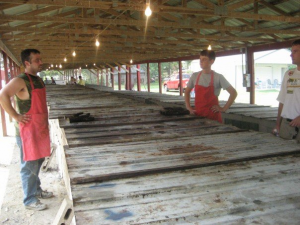By Josh Bowen, on Thu Aug 8, 2013 at 8:30 AM ET
From The Lexington Herald-Leader:
Josh Bowen fitness expert and personal trainer at Fitness Plus 2 shares the secrets to Miss Kentucky Jessica Casebolt’s stage-ready body.
He talks the T.B.D.A.S workout, where people go wrong with their workout and the secrets to getting fit.
By Jonathan Miller, on Wed Aug 7, 2013 at 5:00 PM ET Provocative video from the Brave New Foundation, in partnership with the Drug Policy Alliance.
What say you?
What Breaking Bad REALLY Tells Us about the War on Drugs from Brave New Foundation on Vimeo.
By RP Nation, on Wed Aug 7, 2013 at 4:30 PM ET Nick Simon, the well-respected CEO of Publisher’s Printing in Sheperdsville, Kentucky, has submitted the following response to Jonathan Miller’s column this week in The Daily Beast: “McConnell’s Fancy Farm Monster Comes Back to Haunt Him.” Enjoy:
If the McConnell-Grimes U.S. Senate race in Kentucky in 2014 turns out to be as close as you think, McConnell has an “ace in the hole.” This is the State Constitutional provision denying felons the right to vote. The right can only be restored by a formal pardon from the Governor. This provision was established in the Kentucky State Constitution of 1892 and modified by Section 145 ratified in 1955. Section 145 was proposed by the General Assembly in 1954 and ratified by the voters in 1955. To the best of my research, both the 1892 Constitution and Section 145 were enacted with Democrats controlling both the Governor’s mansion and both Houses of the General Assembly.
The Commonwealth of Kentucky does not keep official records on the number of felons in the state. But from two websites, the Sentencing Project and Federal Probation, I got estimates that range from 125,000 to 240,000. Surveys of felons who have the right to vote in other states show they break for the Democratic candidate by 2.5 – 3 to 1 over the Republican candidate.
Kentucky is one of three states (the others are Florida and Virginia) that disbar felons from voting for life. So let’s say Kentucky had more “normal” state rules – felons could vote after their sentences are completed, including completion of all parole and probation. Let’s be conservative with the number of felons in the state and take the low figure of 125,000. Let’s say they only break 2 to 1 Democratic, Kentucky being more conservative than the nation as a whole, so their felons might be a bit more conservative also. Of these felons, let’s say only 25% register and vote – 25% of 125,000 is 31,250 votes. They break two-thirds Democratic and one-third Republican 20,834 Democratic votes – 10,416 Republican votes equal a 10,418 net vote margin to the Democratic candidate.
So this 10,418 vote deficit is McConnell’s ace in the hole. Because of the restriction of the franchise to felons in the state, Allison Lundergan Grimes will start election night with a tally of negative 10,418 votes, versus what she would start out with in one of the 47 other states in the Union (excluding Virginia and Florida). I did not research the number of felons in the state in 1984, but arguably McConnell’s victory margin of 5,269 votes over Dee Huddleston in 1984 was because of this restriction of the franchise. So on election night in 2014, if McConnell ekes out a victory of 10,418 votes or less, he needs to send a bottle of bourbon over to State Democratic Headquarters in Frankfort. For it was voting rules restricting the franchise of felons established by Democrats who will have made his victory possible – McConnell’s 10,418 vote “Ace in the Hole”.
By Liz Roach, on Wed Aug 7, 2013 at 1:30 PM ET  Smoke wafts from the barbecue pits, spreading an intoxicating scent over the picnic grounds. Thousands of people line up for pork and mutton sandwiches, drenching them in a signature sauce. A barbecue festival? Nope. Smoke wafts from the barbecue pits, spreading an intoxicating scent over the picnic grounds. Thousands of people line up for pork and mutton sandwiches, drenching them in a signature sauce. A barbecue festival? Nope.
It’s one of the nation’s premier cook-outs: Fancy Farm. Described as “the world’s largest picnic,” the event is an annual fundraiser for St. Jerome’s Catholic Church, located in the small town of Fancy Farm (yes, it’s a real name), Kentucky. It’s also one of the biggest political events in the nation, featuring fiery speeches delivered by Kentucky’s top elected officials.
While political junkies relish the folksy punch lines and witty campaign signs, others avidly anticipate the fixings on offer. Those in-the-know arrive early to join the snaking line to the Knights of Columbus Hall, which contains a famous buffet. Featuring home-style cooked helpings of green beans, purple hull peas, potato salad, corn, more of that Western Kentucky-style barbecue, and a selection of cakes and pies, all of the dishes are grown and prepared by local community members.
With approximately 18,000 pounds of pork and mutton and hundreds of pounds of vegetables cooked up each year, preparing the food for Fancy Farm is a mammoth undertaking. Even the Food Network stopped by a few years ago to cover the festivities.
The lead-up events to Fancy Farm also provide an array of mouth-watering options. From the Marshall County Bean Supper and the Burgoo & Bluegrass dinner on the Democratic side to the Graves County Breakfast and “Night Before Fancy Farm” fried chicken dinner on the Republican side, both parties offer traditional Kentucky dishes to sate the crowds, along with a generous serving of rhetorical red meat.
For a taste of Fancy Farm, check out the photos below:
 The BBQ pits
By John Y. Brown III, on Wed Aug 7, 2013 at 12:00 PM ET  Lost in Translation? Lost in Translation?
How do you communicate with a mere gesture or casual glance to the guy in the Pontiac Sunfire tailgating you on the Watterson this morning that you are listening to and channeling Lenny Kravitz BUT that you can’t go any faster because you got a speeding ticket in this same area last week and can’t risk being late for your 7:30 client update meeting.
But you want him to know …that Mr Lenny Kravitz has no patience with tailgaters and does not want to see this happen ever again on the Watterson. Especially during an air guitar solo of Are You Gonna Go My Way.
I did the best I could to communicate this specific message with the facial expression that came to mind but am afraid parts of it–especially the Lenny Kravitz part—may have gotten lost in translation.
By Krystal Ball, on Wed Aug 7, 2013 at 10:00 AM ET  President Obama just gave another economic speech, this time in Phoenix, aimed at helping middle class families attain the American dream of home ownership. In truth, however, owning a home is only one part of the American dream. The real core of the American Dream was illustrated well recently by Robert Putnam, a social scientist whose work on community and inequality has influenced the president. In a recent op-ed for The New York Times Putnam talks about the way his hometown of Port Clinton, Ohio, has crumbled. He warns that the American dream is in danger of crumbling right along with it as manufacturing jobs leave and Port Clinton residents become locked in a cycle of poverty, hopelessness and despair. President Obama just gave another economic speech, this time in Phoenix, aimed at helping middle class families attain the American dream of home ownership. In truth, however, owning a home is only one part of the American dream. The real core of the American Dream was illustrated well recently by Robert Putnam, a social scientist whose work on community and inequality has influenced the president. In a recent op-ed for The New York Times Putnam talks about the way his hometown of Port Clinton, Ohio, has crumbled. He warns that the American dream is in danger of crumbling right along with it as manufacturing jobs leave and Port Clinton residents become locked in a cycle of poverty, hopelessness and despair.
I just spent the summer with my family and my new baby in my own crumbling rust belt town and I can attest to the fact that seeing that sort of regional despair up close has a way of clarifying your thinking. My little town of East Liverpool, Ohio, used to be the pottery capital of the world. Now China is the pottery capital of the world. The next town over, Midland, PA., used to be home to one of the largest steel mills in the country, offering thousands of good, union, middle class jobs. Now the mill is all but defunct. What will replace these jobs? That’s the real economic question we need to focus on, the real heart of preserving the American dream. After all you need a job and money to buy a house.
We tend to romanticize our era of manufacturing dominance and there is something wonderful about making things. Perhaps with new technology and new economic incentives we can restore some of our manufacturing prowess but there’s no time machine to take us back to the good old days. But listen to Richard Florida, senior editor at the Atlantic. He suggests the job boom we really need is staring us right in the face. Jobs that can’t be outsourced, in a sector that is already growing rapidly. The service sector. Jobs like retail clerks, home health care providers, childcare workers.
As manufacturing jobs have declined in this country, service sector jobs have increased. Perhaps rather than trying to bring back a bygone manufacturing era, we need to find a way to make service jobs the sort of good jobs that you can support a family on, buy a car with, take vacations on.
I don’t know exactly how we do it. But I know the activism among fast food workers and WalMart employees is a good start. I know that companies like Costco and Zappos and Amazon are leading the way by showing that a respected worker is a productive worker. And I also know that turning service jobs into middle class jobs will likely require a willingness among all of us to pay a bit more for the services we use. But keep in mind, manufacturing jobs were not always so great. They started out dirty, low paid, and dangerous. Perhaps service sector jobs can evolve just as manufacturing jobs did in those good old days.
Home ownership is fine. Bridges and roads are great. Education is absolutely critical. But what we really need to preserve the American Dream is a realistic path for all to the middle class through a fundamental shift in the way we view and treat our service workers. Oh, and it might help to have a Congress that was actually interested in tackling these problems, or might even be in session now and then.
Originally posted at MSNBC.com.
By Greg Harris, on Wed Aug 7, 2013 at 8:30 AM ET
By Lauren Mayer, on Tue Aug 6, 2013 at 1:30 PM ET I’ve always prided myself on being open-minded, on recognizing that there are two sides to every question. Being a competitive high-school debater was great training, since we had to argue, convincingly, the pro and con of each year’s topic (which may partially explain why so many debaters ended up in law school). And it’s certainly a skill one can use raising children, keeping us from instantly snapping, “Are you kidding? You can’t wear your rainboots and your SpongeBob sweatshirt to pre-school, it’s 90 degrees out,” or “I don’t want to hear what the guy on that brainscience site said about the intellectual stimulation of videogames.” (And yes, I’ve had both of those conversations and had to resist those lines!)
Even during contentious elections, I’ve tried hard to see the other side – and it helps that I have some good friends whose politics differ from mine. (Which, in case you hadn’t guess, range from really liberal to extremely liberal.) Plus my Republican friends represent a much more civil alternative to the louder advocates of their views (see Limbaugh: Rush . . . ). Of course, the way they often distinguish themselves reminds me of one of my favorite New Yorker cartoons, where a woman is telling a friend about her date: “He says he’s a fiscal conservative and a social liberal – which means he’s cheap, and he sleeps around.” But cartoons aside, I can see how they can feel liberal about issues like decriminalizing marijuana or gay marriage, and more conservative about financial matters.
However, sometimes the ‘other side’ goes so far that I simply cannot find any way to understand it, no matter how hard I try, and I can only conclude they are either heartless or insane. (Which makes me feel like Elizabeth Bennett in “Pride & Prejudice,” chiding Jane for trying to find a way to side with both Wickham and Darcy . . . but I digress) I used to think of North Carolina as an oasis of moderation in the middle of the south, a place I could actually see living (and where I could buy a house for the cost of a driveway in California). But lately it seems like many southern states have gone off the deep end in their efforts to restrict women’s reproductive choice, to suppress voting, and to shred the social safety net, and North Carolina seems to be one of the loonier ones. There are a couple of bright spots – the attorney general did point out that establishing Christianity as the state religion was a major violation of the US Constitution, and they’ve drawn so much national attention that things may change. But in the meantime I’ll take advantage of my own personal bright spot – realizing that the tune that kept running through my head was in the public domain, so I could do a guilt-free parody . . .
By RP Staff, on Tue Aug 6, 2013 at 1:30 PM ET The Missouri Times collected a list of more than 100 people in the world of politics and political media that you need to know if you don’t already. The list doesn’t include legislators, but rather their staff and the governmental relations personnel and consultants that affect the outcomes of the legislator’s actions. Follow them on Twitter, familiarize yourself with their work and keep an eye out, because these people are not going anywhere.
Recovering Politician and former Missouri State Representative Jason Grill made the cut:
Jason Grill
Principal, JGrill Media & Consulting
Twitter: @jasongrill
This former member of the House has a leading media and governmental relations firm in Kansas City while also continuing to practice law. He seems to never sleep with all of the hats he wears, including hosting a radio show.
By John Y. Brown III, on Tue Aug 6, 2013 at 12:00 PM ET  How to know if you have reached middle age? How to know if you have reached middle age?
When someone asks you “If you could live your life over again what things would you do differently?” and you give them an exasperasted look that has an undercurrent of disgust and reply,
“What are you talking about? Are you even serious? People don’t get to live their lives over. At this point I’m not even sure I have the energy to finish the life I am living now much less think about a do over.”
If your response sounds like this you are probably middle-aged.
|
The Recovering Politician Bookstore
|












